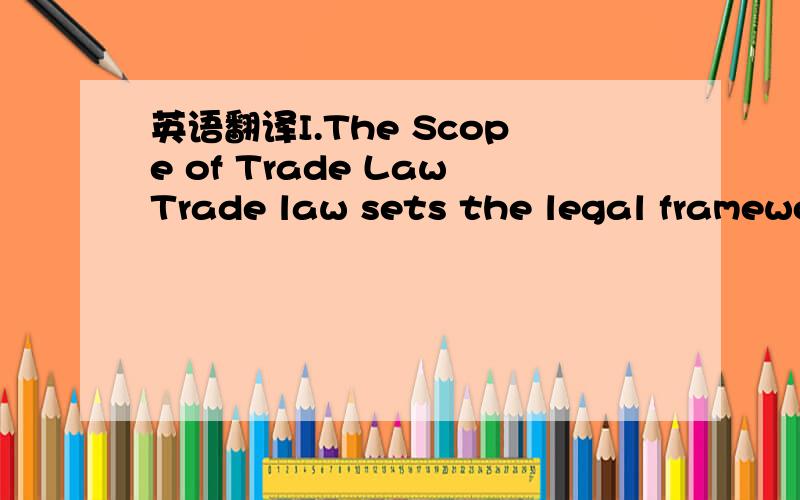英语翻译I.The Scope of Trade LawTrade law sets the legal framework for cross-border commercial transactions.Trade lawtakes shape in global,regional and subregional arrangements among governments.At thesame time,all countries maintain domestic law
来源:学生作业帮助网 编辑:作业帮 时间:2024/11/16 16:34:59

英语翻译I.The Scope of Trade LawTrade law sets the legal framework for cross-border commercial transactions.Trade lawtakes shape in global,regional and subregional arrangements among governments.At thesame time,all countries maintain domestic law
英语翻译
I.The Scope of Trade Law
Trade law sets the legal framework for cross-border commercial transactions.Trade law
takes shape in global,regional and subregional arrangements among governments.At the
same time,all countries maintain domestic laws on trade,and much of trade law’s
application involves reconciling conflicting supranational rules and domestic statutes.
Domestically,the United States has an extensive system of law governing international
trade.First and most simply,U.S.laws set tariffs on imports into the United States.Many
people are not aware that the infamous and high Smoot-Hawley tariffs of the 1930s are
still on the books.They are superseded by application of the WTO’s most-favored-nation
(MFN) rule,which requires that WTO members must extend to all trading partners the
tariff levels granted to their single “most-favored” partner.This is why MFN status for
China was such a contentious issue through much of the 1990s,when China was not a
WTO member and Congress had to act annually to grant MFN status to China.If MFN
were not granted,tariffs on imports from China would snap to Smoot-Hawley levels,
making Chinese products prohibitively expensive.
Congress finally granted permanent MFN status to China to avoid the annual dust-up,
though in the process proponents changed the nomenclature from “most-favored-nation”
to “normal trade relations” (NTR) to avoid giving the impression that China was getting
some kind of favorable treatment.NTR has now become the term of art in U.S.trade
discourse for the MFN principle,and is catching on in the rest of the world.
In 2002 Congress granted trade negotiating authority to President Bush under what used
to be called “fast track” terms,by which the executive negotiates a complete trade
agreement with a trading partner or group of partners,and Congress quickly votes yes or
no,without amendments,on the final deal.Fast-track authority had earlier been denied to
President Clinton largely over concerns that labor standards and environmental protection
were inadequately addressed in the legislation.
英语翻译I.The Scope of Trade LawTrade law sets the legal framework for cross-border commercial transactions.Trade lawtakes shape in global,regional and subregional arrangements among governments.At thesame time,all countries maintain domestic law
贸易法,劳工与全球不平等
贸易法的范畴
贸易法是为跨边境金融交易所设定的法律框架.贸易法在对全球,地区,次区域的安排上,被各界政府所用.同时,所有国家保有本国对贸易的法规.常常国际条例与本土情况冲突的时候,就业贸易法解决.
在美国国内,有一套覆盖面很全的法律系统用于管理它的国际贸易.最简单来说,美国法律要求对进口物品加关税.很多人都不知道1930那臭名昭著的斯姆特-霍利关税法任然有效.在WTO它被另一项法规–MFN(最优国待遇)取代了.WTO要求所有成员国之间都给予相同的关税.以前美国国会必须年年发MFN给中国.这就是为什么在九十年代对于给中国一个‘MFN’的身份会被广泛讨论.如果不是有MFN,那么对中国的关税就会依照斯姆特-霍利关税,而其结果就是中国的物品变得非常贵.
国会最后决定直接给中国各长期的MFN以省去每年的麻烦.但为了不给人留下为中国搞特殊待遇的印象,国会专门为中国颁发了一个特别的叫做NTR(正常贸易关系)的身份,【其实从实际作用上来说NTR=MFN】.美国国会发明的这个新词绕过了MFN的很多硬规定,【典型的挂羊头,买狗肉,妙就妙在绕过了WTO的那些一板一眼的烦人】相当好用,被国际社会广泛借鉴.
在2002年,国会授予布什以‘快轨程序’(就是当行政当局谈了生意回来,国会直接就投票通过或不过的权利.且国会的决定是最终的,绝无修改).以前国会拒绝给克林顿这个权利,主要是考虑到立法中没有足够重视劳工与环境保护.
差不多这样的.